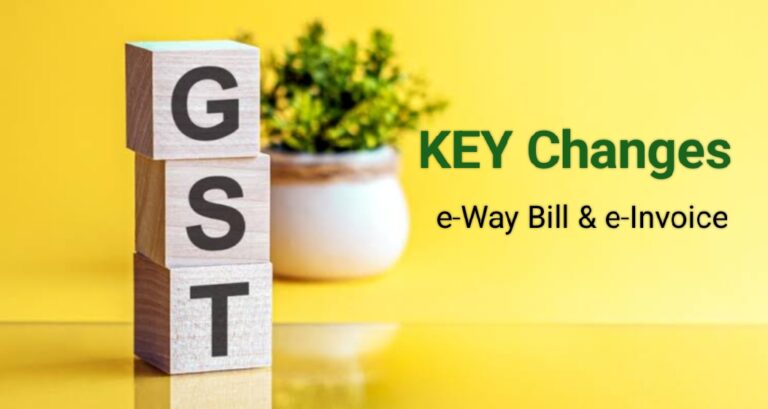As we step into the new financial year 2025-26, businesses must stay updated with the recent changes in GST compliance, especially with respect to E-Way Bills and E-Invoicing. These are not mere procedural formalities; they are crucial legal documents that validate the supply of goods/services and the movement of goods under GST.
Any errors or delays in generating these documents can severely impact both suppliers and recipients — including denial of Input Tax Credit (ITC), penalties up to 200% of tax involved, or other legal consequences. With the introduction of new invoice series and system upgrades, staying compliant with the latest updates is vital.
Here are 5 important GST E-Way Bill and E-Invoice changes for FY 2025-26 that every taxpayer and business should understand and implement immediately.
1. Multi-Factor Authentication (MFA) Mandatory for All Taxpayers from 1st April 2025
To enhance security, the GSTN has mandated Multi-Factor Authentication (MFA) across the E-Invoice and E-Way Bill portals. Previously applicable only to businesses with higher Annual Aggregate Turnover (AATO), This is changed and MFA is now compulsory for all taxpayers and sub-users from 1st April 2025.
-
MFA includes login via username, password, and OTP sent to the registered mobile or Sandes App.
-
Ensure your registered mobile number is current and sub-user profiles have valid mobile details.
🔗 Source: GSTN Advisory dated 17.12.2024
2. IRN Generation Now Case-Insensitive (Effective 1st June 2025)
Starting 1st June 2025, the Invoice Reference Number (IRN) system will treat invoice/document numbers as case-insensitive. Whether your invoice number is entered as “abc”, “ABC”, or “Abc”, it will be treated uniformly by converting it to uppercase before IRN generation.
This change brings alignment with GSTR-1 filings and helps avoid IRN duplication errors due to format inconsistencies.
🔗 Source: GSTN Advisory dated 04.04.2025
3. 30-Day Reporting Limit for E-Invoices (AATO > ₹10 Crores)
As per a recent change under GST, from 1st April 2025, businesses with AATO exceeding ₹10 Crores will not be allowed to report e-invoices older than 30 days from the invoice date on the Invoice Registration Portal (IRP).
-
Applicable for all document types: Invoices, Credit Notes, and Debit Notes.
-
Example: An invoice dated 1st April 2025 must be reported by 30th April 2025.
-
Non-compliance can lead to denial of ITC for buyers.
⚠️ For businesses with AATO between ₹5–10 crores, e-invoicing is mandatory but the 30-day restriction is not yet applicable.
✅ Pro Tip: Integrate your ERP or accounting system with the IRP for real-time invoice generation and avoid delays.
🔗 Source: GSTN Advisory dated 05.11.2024
4. E-Way Bill Can Only Be Generated for Documents Dated Within 180 Days
Effective 1st January 2025, the E-Way Bill system will restrict generation to only those documents that are not older than 180 days.
-
Example: After 1st January 2025, documents dated before 5th July 2024 will not be eligible for E-Way Bill generation.
This change aims to prevent backdated entries and ensure real-time tracking of goods movement.
🔗 Source: GSTN Advisory dated 17.12.2024
5. E-Way Bill Extension Limited to 360 Days from Original Generation Date
From 1st January 2025, businesses can only extend E-Way Bills up to 360 days from the original generation date.
-
Example: An E-Way Bill issued on 1st January 2025 can be extended only up to 25th December 2025.
This change brings better control and closure to prolonged consignments or delays.
🔗 Source: GSTN Advisory dated 17.12.2024
Conclusion: Stay Compliant, Stay Ahead
The 2025-26 GST updates make it clear — compliance and automation are key. Businesses should:
-
Update internal SOPs across all departments (not just finance).
-
Train teams including sales, warehouse, logistics, and dispatch.
-
Regularly audit and update GST portal details like mobile numbers.
-
Upgrade ERP/accounting software for seamless e-invoice and e-waybill generation.
✅ Proactive adaptation today will prevent penalties, ITC denials, and legal hurdles tomorrow.
For expert guidance and compliance support, consult a GST professional to audit your systems and processes.
Also Read: Calcutta High Court Rules: No GST Penalty for Route Deviation in E-Way Bill if No Tax Evasion
Stay GST compliant. Stay stress-free.
READ MORE
Delhi High Court Rules: No Section 69C Addition for Cash Purchases Duly Recorded in Books
AO Cannot Issue Reassessment Notice Without Specifying Bank Name: Rajasthan HC Ruling
